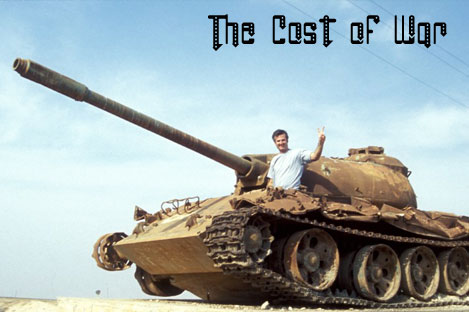
The Cost of War
The first thing we think of in the west when evaluating war is how many people died. We scan the numbers on the television and put the size of the conflict in perspective in terms of loss of life. Inevitably a foreign correspondent somewhere uses the term economic cost. What the heck does that mean? I hate to even put the phrase down here as I fear people will groan and flip to another website. I want you to empathize with me for a moment what options people have. We in the North America haven’t had a modern war on our continent we have very little idea.
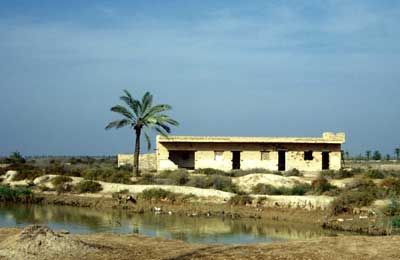
Dream house next to river and ocean
I hope you feel something of how I felt recently. Almost all of these revelations occurred to me over a couple weeks driving around Abadan Iran, an area that was the center of the Iran Iraq war 18 years ago. Over a million people died in that war.
The thing that really impacted me was driving by an apartment with a huge hole in the wall. Looking in through the hole I could see a kitchen and some kitchen furniture scattered around the room the table still standing. Cracked tiles and a couple of pictures hanging crookedly on the wall, a clock hanging by its wires stuck at a numberless 5:27.
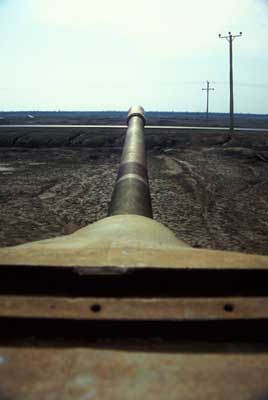
Tank barrel looking at Iraq (green bushes are Iraq)
No one lived there. But someone still owned it. Their table waited for dinner. Where did the people go? What happened here?
If a bomb comes through your roof and blows a hole in it, or soldiers fight from your kitchen window or roof top. Fragments, rockets, bullets and other munitions of war find their intended purpose in your walls. What would you do? My house the battle ground?
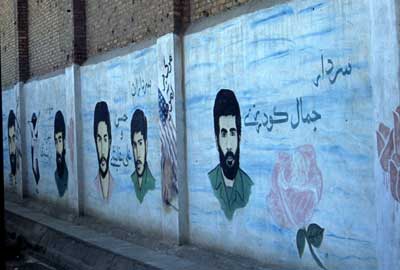
Wall of martyrs (no love for US bombs)
You, like me and most others would leave. Try and find somewhere safe. Perhaps a new area or town where the fighting is not so fierce. Try to resume some sort of life.
In comparison in the west we invest in our childrens future by having them involved in a variety of activities. Sports, music, education and interaction with other kids. What would happen if children in North America couldn’t do these things? What would the impact be? Would they be able to contribute? Could they get a job? If you took away their education what would you have? If there was no socialization with other kids would they be able to communicate with one another as adults?
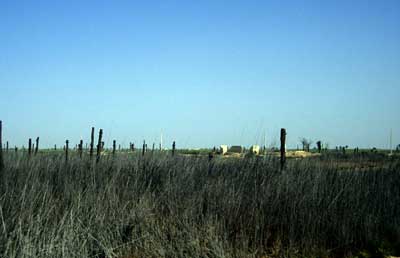
Destroyed Date farm
Now add a war. Children would learn different skills, learn different values. Children are sponges and absorb everything around them. Do you think they will have fond memories of childhood? Will they think highly of their former enemies? Will they be capable of rebuilding the world that is left to them?
There is no “normal” in war. Can you prepare children for their future or are you just surviving? If you are just surviving yourself are you preparing for your own future, your later years where you may not be able to look out for yourself. Are there hospitals if you get sick? Not just wounded. We have hospitals in the west that are full of sick people without any wounded.
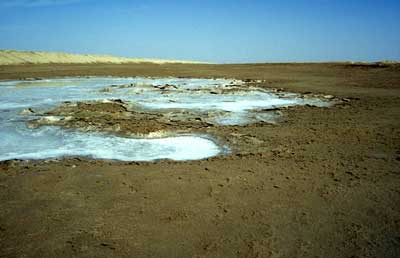
Salt Crystals in dried out puddle
If I leave the war now I am a refugee. The word refugee in the west is synonymous with uneducated and impoverished people. No one wants a refugee. Teachers, doctors, nurses, accountants, computer programmers, professors, tradesman, everyone educated or non educated it does not matter everyone becomes a refugee, except the soldiers. There is no wealth. There is only survival.
People who leave due to war are extremely unlikely to leave a situation where their family or loved ones are left unscathed. What wounds will memories reopen?
Once the war eventually ends will I return? Perhaps I will go see what is left of my former home. Even if there is something left, is it worth it to fix it? Can I find a job in the local economy to finance repairs. If I start a business will anyone have any money to buy things from me. Can I buy the materials to do repairs. Can I call up the municipal government to hook up water and electricity. When I flush the toilet is the pipe still connected? Where will it flow out?
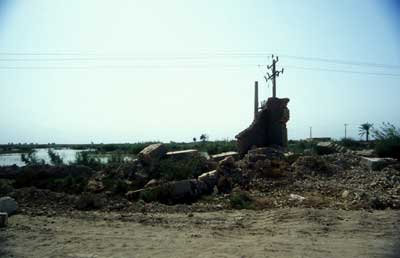
More rubble on the Iraq border
Perhaps I should just stay where I am. Where I moved to to avoid the fighting in the first place.
How long does it take to build a town. Likely the town you live in took many years to reach its size. If it boomed quickly, it was likely due to some great source of income that people came to take advantage of. After a war these don’t exist.
What of my neighbors? Will anyone return? What if they are dead. Maybe they their property to someone who will never move there. What if I fix my place up and the view out the front window is rubble. Could I ever resell that? How much would it be worth?
What about a community full of homes half destroyed. The buildings that survived or that are repaired are surrounded by the remnants of war. How is that supposed to inspire people to return? It takes a long time. It takes a healthy economy. Where does the money come from?
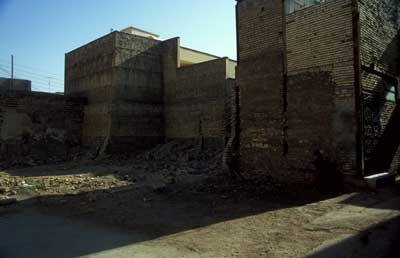
Abadan streets
This is real. This is happening today. Right now as you read this, likely somewhere that is not in the news. This is a situation every war zone in the world has to deal with. Rebuilding. When the death toll stops so do the cameras. The destruction remains.
One of the most underestimated factors is the environmental impact of a war? Sure there are some craters out there. Maybe some unexploded bombs. Land mines are usually hidden under the ground put there as a desperate measure of defense. How many decades will they stay hidden before they end a life?
The less obvious leave the largest impact. During the Iran Iraq war a makeshift bridge was made over the Baramasheer river in order to get tanks across. The river was filled up with dirt. Not only did it stop the river, it prevented the ocean tide from rising up the river. This caused a salt water flood. Salted farmland. Rich soil that once been able grow things on was no longer able to sustain life. The oldest gardens in human history dead. Still 18 years later the soil is contaminated with salt. Some tall grass grows wild. 30 ft date tree stumps stand in the middle of a desert of sand. No leaves, just dead black stalks. Yet when you take a handful of soil it is dark and rich. Until someone removes the salt from the soil it will this way.

Reconstruction of Abadan
Of course I asked “How do you remove salt from the soil?”. It takes many generations. You have to flood the area with fresh water. Then let it evaporate so the salt forms on the top. You then need to physically scrape the salt away. Then flood it again and repeat the process. It could take generations before anything grows again.
I drove by a home and could envision how beautiful it once must have been. Next to a river a few miles from the sea. Cool breeze on a hot day, it once had a large garden and date grove. Would have been something special. The house is now pock marked with the signs of war. Now abandoned. The signs of bad memories remain.
War does not stop when the fighting ends.
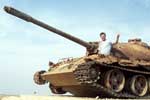
- The Cost of War
- by Steve McGrath
- Published on May 1st, 2005
- Photos:
- Steve McGrath
More from Steve McGrath:
-

Tourist vs. Traveler
Well intentioned and inspired as I might consider myself. I am still a tourist. I take photos of everywhere I go. I visit the beautiful places. I see some of the other places, I meet locals but I can not become a one..
-

Iran shirt shopping
Iranians are so happy to meet travelers. You quickly attain celebrity status. It is great, yet it is overwhelming. Everyone is so nice all of the time it is impossible to get any freedom to do anything. It sounds strange and it is..
-

Small Peters
Tomas is an amazing kid with a sharp mind and the curious nature of a kid. One of his favorite things to do is to ride up to a newspaper box, point and ask “hey what is in the news?”..
-

The Cost of War
Almost all of these revelations occurred to me over a couple weeks driving around Abadan Iran, an area that was the center of the Iran Iraq war 18 years ago. Over a million people died in that war.
-

Governments and Gay Marriage
..there is thought that gay marriages destroy the sanctity of marriage. Doesn’t divorce destroy the sanctity of marriage. Perhaps that should be illegal too…
-

Why I can’t play video games anymore.
He knows all the calibres the stats magazine sizes, types of scopes manufacturers, accuracy, damage and so on. He is 8 and he is in grade 3. What do you know in grade 3? Geography? History? Math?
Other recent features:
-

Sónar 2010 – Barcelona, Spain
The festival attracts a lot of outsiders, but the Mediterranean, Spanish and more specifically Catalan nature of the people makes the festival what it is. Catalan people are passionate and this passion is infectious. The atmosphere is electric in Barcelona as a city and heightened by music and intoxicants at Sónar.
-

Summer Party Naval Styles at Seven RestoLounge
Oysters, like wine are affected by terroir and these Miyagi’s flavor profiles ranged with one showing a cleaner, almost tropical profile and the other being more salty, marine driven. As I was devouring the seemingly endless plates put in front of us, I sipped on a glass of fine sauvignon blanc.
-

R4NT Radio March 2010
R4NT Radio March 2010 um wow it’s been far too long since the last edition edition, featuring: Hector Hernandez, The Infesticons, Blockhead, Gramatik, Emika, Thunderheist, Parov Stelar, Eddy Meets Yannah, Anti-Pop Consortium, The Slew, Lighterthief, Andreya Triana, Parasyte Woman, Mathon, Venetian Snares, and Funki Porcini.
-

O Restaurant & Lounge revisited
Calgary has a diverse set of urban communities, most of which have the ubiquitous strip mall watering hole. In the South West community of Marda Loop, a reinvention of this paradigm has been established.
-

Predictions 2010.. and beyond!
So 2010 eh? Almost but not quite (no year zero they say) another decade? It seems like just yesterday that the world was waiting for Y2K. R4NT started publishing in March 2001, so we’re not quite 10 years old yet, but in internet years we are already a senior citizen.
-

Invictus
No matter what, the reality of Nelson Mandela is something that deserves screen time. Should this film even remotely intrigue the masses to take interest in this figure, the world would likely benefit greatly from it.

